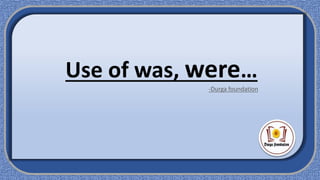
ppt on use of was, were....pptx
- 1. Use of was, were… -Durga foundation
- 2. Past tense helping verb… was were Singular Plural
- 3. Use of was, were in case of noun and pronoun… • We can use the helping verb (was, were) with noun as directed previously. • But, in the case of Pronoun, we have to notice some thing different. • There are some pronouns which are used commonly by us such as I, he, she, it, they, you, we.
- 5. Now, go with some examples based on use of “was” Assertive sentences Note - We should use ‘was’ only with ‘I, he, she, it and singular nouns’. Rule- singular noun/pronoun + was+ verb + object + other words… Example- 1. I was a student of 11th standard in 1999. 2. He was going to start a new job next week. 3. She was hungry. 4. Seema was waiting for you. 5. It was raining yesterday.
- 6. Now, go with some examples based on use of “was” Negative sentences Note - We should use ‘was’ only with ‘I, he, she, it and singular nouns’. Rule- I + was + not + verb + object + other words… Example- 1. I was not a student of 11th standard in 1999. 2. He was not going to start a new job next week. 3. She was not hungry. 4. Seema was not waiting for you. 5. It was not raining yesterday.
- 7. Now, go with some examples based on use of “was” Interrogative sentences Note - We should use ‘was’ only with ‘I, he, she, it and singular nouns’. Rule- was + singular noun/pronoun + verb + object + other words + ? Example- 1. Was I student of 11th standard in 1999? 2. Was he going to start a new job next week? 3. Was she hungry? 4. Was Seema waiting for you? 5. Was it raining yesterday?
- 8. Now, go with some examples based on use of “was” Interrogative negative sentences Note - We should use ‘was’ only with ‘I, he, she, it and singular nouns’. Rule- was + singular noun/pronoun + not + verb + object + other words + ? Example- 1. Was I not student of 11th standard in 1999? 2. Was he not going to start a new job next week? 3. Was she not hungry? 4. Was Seema not waiting for you? 5. Was it not raining yesterday?
- 9. Now, go with some examples based on use of “were” Assertive sentences Note - We should use ‘were’ only with ‘we, they, you and plural nouns’. Rule- plural noun/pronoun + were + verb + object + other words… Example- 1. These people’s were student of 11th standard in 1999. 2. They going to start a new job next week. 3. You were hungry. 4. We were waiting for you.
- 10. Now, go with some examples based on use of “were” Negative sentences Note - We should use ‘were’ only with ‘we, they, you and plural nouns’. Rule- plural noun/pronoun + were + not + verb + object + other words… Example- 1. These people’s were not student of 11th standard in 1999. 2. They were not going to start a new job next week. 3. You were not hungry. 4. We were not waiting for you.
- 11. Now, go with some examples based on use of “were” Interrogative sentences Note - We should use ‘were’ only with ‘we, they, you and plural nouns’. Rule- were + plural noun/pronoun + verb + object + other words… Example- 1. Were these people’s student of 11th standard in 1999? 2. Were they going to start a new job next week? 3. Were you hungry? 4. Were we waiting for you?
- 12. Now, go with some examples based on use of “were” Interrogative negative sentences Note - We should use ‘were’ only with ‘we, they, you and plural nouns’. Rule- were + plural noun/pronoun + not + verb + object + other words… Example- 1. Were these people’s not student of 11th standard in 1999? 2. Were they not going to start a new job next week? 3. Were you not hungry? 4. Were we not waiting for you?